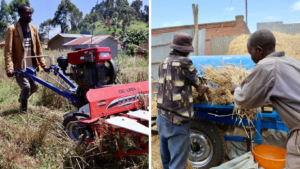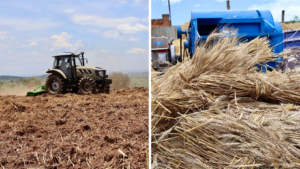Support Gorilla Conservation >

Following the formation of wheat-growing cooperatives, supported by Virunga National Park and the European Commission, smallholder farmers in the Lubero district saw a successful harvest season in 2023 – the first one for 25 years. The next step in the ongoing development of this green economy is to improve efficiency and make the montane area more viable as a wheat-producing region.
Farmers of the various cooperatives are being granted access to automated harvesters, tractors, and threshers – a machine that can be used to separate grain from wheat – as well as training in how to operate equipment. Through implementation of this major mechanization drive, it is hoped that improved efficiency can be achieved by the next harvest in late 2024, and that land deemed fit for wheat-farming can start being converted into usable plots, helping the cooperatives to strive towards their 500-hectare target.

As well as delivering improved performance on hand tools, these new technologies will make farmers’ lives easier by speeding up the process of wheat-harvesting. As with all projects linked to the Virunga Alliance – a non-profit organization set up to stimulate a green and equitable economy in and around the Park – mechanization aims to benefit local people economically and in terms of life-quality, while protecting the rich surrounding nature from exploitation through a sustainable approach.
Thanks to tractors at the site of Luofu, farmers are already reaping the rewards of mechanization, with more than 50 hectares plowed in preparation for the sowing of seeds. The next harvest season looks promising, as does the outlook for the region’s entire wheat-growing sector.
